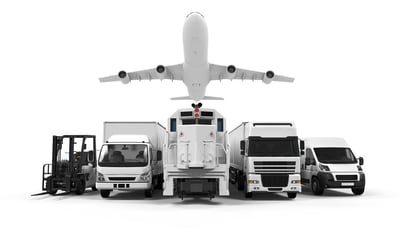International vs. Domestic Freight Forwarding: Understanding the Difference
Whether you need an international freight forwarder or a domestic freight forwarder, you will be hiring a company with a specialty in working with multiple shipping companies to move your goods from point A to point B. Sometimes, freight forwarders are referred to as the travel agents of international and domestic trade.
Think of your freight forwarder as the middleman between the shipping services and you. The contracts freight forwarders have negotiated will help to ensure your goods get moved safely and arrive on time. Good international and domestic freight forwarders know exactly how to move your goods across the country or from one country to another.
 What are Freight Forwarders?
What are Freight Forwarders?
When you need to import or export goods, you will likely need the help of a freight forwarder. Even moving goods domestically may become easier with the right domestic freight forwarding partner.
If you don't know what a freight forwarder is, it can be a bit confusing. You may think they are a shipping company or an importing and exporting partner. However, a commercial freight forwarder isn't either one of these things.
Moving goods from one country to another, or even across the country in some circumstances, comes with a large amount of paperwork and regulations. International trade is especially complicated and may become rather intimidating if you try to go it alone. This is where a freight forwarder comes in handy.
According to BusinessDictionary.com, a freight forwarder is:
"Firm specializing in arranging storage and shipping of merchandise on behalf of its shippers. It usually provides a full range of services including: tracking inland transportation, preparation of shipping and export documents, warehousing, booking cargo space, negotiating freight charges, freight consolidation, cargo insurance, and filing of insurance claims. Freight forwarders usually ship under their own bills of lading or air waybills (called house bill of lading or house air waybill) and their agents or associates at the destination (overseas freight forwarders) provide document delivery, deconsolidation, and freight collection services."
The simple way to look at a freight forwarder, whether international or domestic is to think of them as a company arranging the shipment of your goods during the importing or exporting process.
Defining what a freight forwarder does is a bit more difficult as it can vary from one freight forwarding company to another. Some freight forwarders offer services others don't offer and a freight forwarder will not actually move any of your freight. Instead, they act as the intermediary between you and the company moving your freight, whether it's being moved on a ship, truck, or airplane.
As the buyer or seller of the goods, you gain the benefit of the relationships a freight forwarder has already established with multiple carriers. This means you don't have to do the hard work of finding the right shipping method and company to handle your goods. In addition, the best freight forwarding companies will handle all the paperwork and some will even act as a customs broker when moving goods from one country to another.
Defining What a Freight Forwarder Does
Whether you need an international freight forwarder or a domestic freight forwarder, the definition of what they will do is about the same. Export.gov says a freight forwarder will do the following:
"To comply with export documentation and shipping requirements, many exporters utilize a freight forwarder to act as their shipping agent. The forwarder advises and assists clients on how to move goods most efficiently from one destination to another. A forwarder’s extensive knowledge of documentation requirements, regulations, transportation costs, and banking practices can ease the exporting process for many companies."
 International vs. Domestic Freight Forwarder
International vs. Domestic Freight Forwarder
A very easy way to look at the differences between an international freight forwarder and a domestic freight forwarder is simply to look at where your goods will be shipped from and arrive at. If both locations are found within the borders of the same country, such as Canada or the United States, you will work with a domestic freight forwarder.
However, if you will be exporting goods from Canada to the USA or from another country to Canada, you will need an international freight forwarding company. Many freight forwarders have the ability to work both internationally and domestically.
At Cole International, we handle all your freight forwarding needs and we are also customs brokers. Whether you need to move goods from one city to another in Canada or you need to cross the border into the United States, our experienced team will ensure your goods arrive safely.
There are several reasons why you should use a freight forwarder, whether you need one for international shipping or domestic shipping. While it's not required to import or export goods, hiring the right freight forwarder for your shipments will make things easier.
Your freight forwarder will become an asset you may not be able to live without once you've found the right partner. When it comes to dealing with international transportation of goods, a freight forwarder is especially helpful. Some of the advantages of hiring an international freight forwarder include:
- Handles the Insurance you need
- Takes care of Customs Documentation
- Offers multiple carrier options
- Handles other documentation
- Will arrange warehousing
- And More!
Basically, your freight forwarders will help to ensure the process of moving your cargo from point A to point B goes smoothly. Everything needed along the way will be handled by your international freight forwarder. If they also happen to be a customs broker, they will likely handle all your needs and issues when your freight crosses the border.
Cole International is a freight forwarder and customs broker in the United States and Canada. We provide everything you need to move goods internationally and domestically. When you need a partner you can trust with your cargo, Cole International will make your international shipping much easier.
Sea Freight vs. Air Freight
When you need to move goods from one country to another, you may be faced with the decision to use sea freight or air freight. Both offer advantages and disadvantages and it really depends on your specific needs.
Hiring an international freight forwarder will give you access to sea freight and air freight options. Here are a few things to consider when you need to choose between air and ocean forwarding.
The Actual Price
Of course, the price of moving your freight from one place to another matters. Comparing the cost of sea freight and air freight will help to ensure you make the right decision. You'll likely want to know which one costs less and it's usually going to be sea freight, but not always.
While the actual price to move your goods is important, making a decision based on price only might be a mistake. Sometimes, paying more means the goods will arrive faster or you may gain access to more protection for your shipment.
How Long it will Take
Air freight is almost always faster than sea freight, which comes as no surprise. Time is money, so considering how long it will take to get your goods from one place to another matters. Often, sea freight takes around a month, while air freight may take just a day or two.
Often, when shipping for business, faster is better. However, if you’re moving a household for an individual, the amount of time may not be as important as the price. Shipping is getting faster, however, and there some ocean freight shipments that can be delivered across an ocean in as little as eight days.
 Environmentally Safe Shipping
Environmentally Safe Shipping
Another factor you may want to consider when choosing between sea freight and air freight is the impact your shipping choice will have on the environment. If you're a socially aware company looking to ship in an eco-friendly way, looking at the CO2 emissions of both sea freight and air freight makes sense.
Air freight transport has a higher level of CO2 emissions making sea freight transport the more eco-friendly option. However, you must also consider the possibility of an oil spill, which may have a larger impact on the environment than the CO2 emissions from an airplane. There really isn't a clear winner for environmentally safe shipping.
Reliability of Sea Freight vs. Air Freight
Of course, you want your shipment to arrive safely without damage. Both sea freight and air freight are very reliable, but air freight tends to be a bit more reliable.
While a flight can certainly get delayed, it's not uncommon for airlines to stay on top of their schedules. Ocean carriers are known for getting off schedule, sometimes by a few days. Even if an air carrier gets off schedule, they have multiple flights per day and can get back on schedule or at least keep the delay to a minimum.
Typically, air freight is used for lighter shipments, while sea freight is used for larger or heavier shipments. While air freight is certainly faster and more reliable, it's also much more expensive. Airlines tend to have stronger regulations for hazardous materials, as well.
Sea freight offers the ability to ship a much larger amount of goods for a lower price. It's slower and there could be customs issues at the ports, but ocean freight allows you to ship in massive bulk making it the right choice when you need to move a large quantity of goods or heavier items.
Whether you need sea freight or air freight, Cole International will make sure you have the right options at your disposal. Our experienced freight forwarders will help you to make the right decision for your specific shipment. Contact us today and find out how our team of experts can help make importing and exporting goods much easier for you.
Suggested Articles on Freight Forwarding: Freight Forwarding: A Complete Guide

